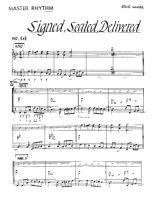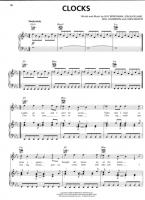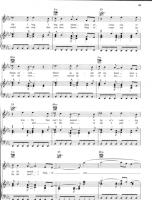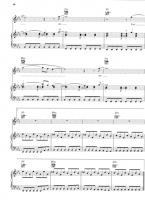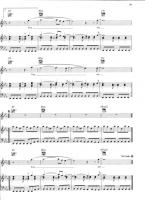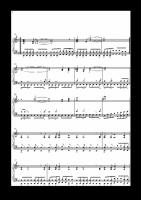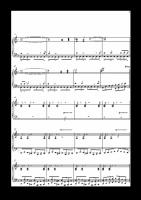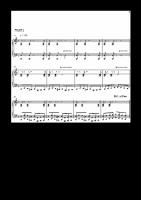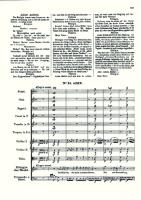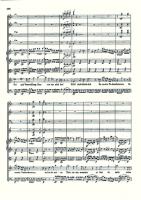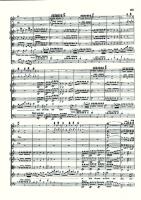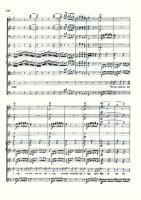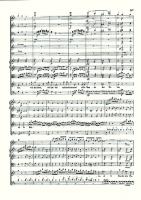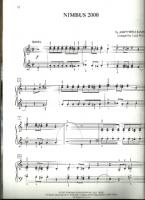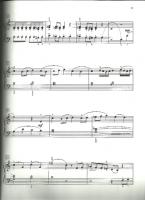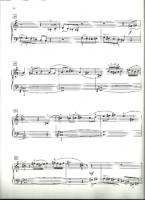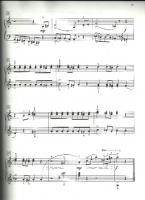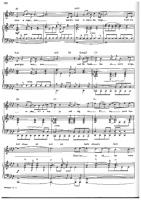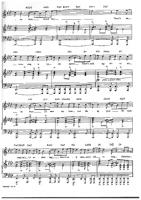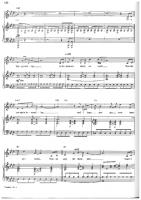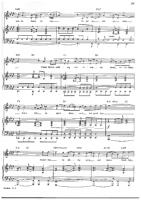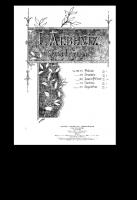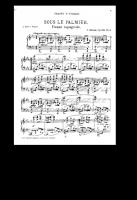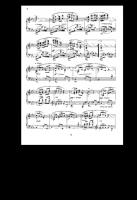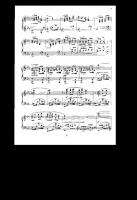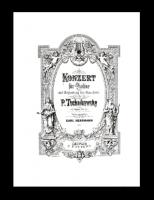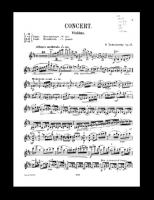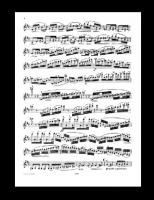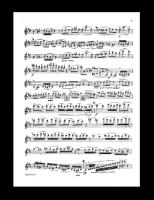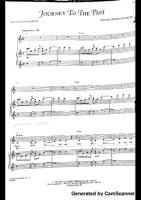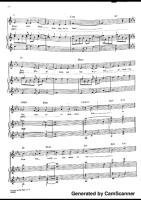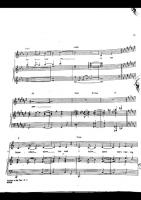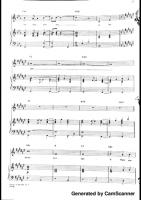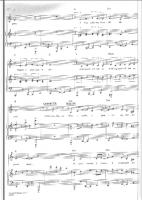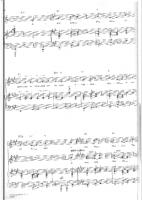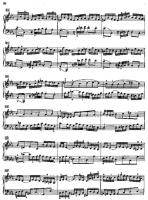Latest Sheets
Keith Jarrett
 Keith Jarrett (born May 8, 1945 in Allentown, Pennsylvania) is an American pianist and composer.
Keith Jarrett (born May 8, 1945 in Allentown, Pennsylvania) is an American pianist and composer.His career started with Art Blakey, Charles Lloyd and Miles Davis. Since the early 1970s he has enjoyed a great deal of success in both classical music and jazz, as a group leader and a solo performer. His improvisation technique combines not only jazz, but also other forms of music, especially classical, gospel, blues and ethnic folk music.
In 2003 he received the Polar Music Prize, being the first (and to this day only) recipient not sharing the prize with anyone else.
james newton howard
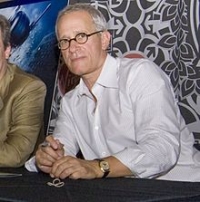 James Newton Howard (born June 9, 1951) is an American composer, conductor, and music producer. He has scored over 100 films and is the recipient of a Grammy Award, Emmy Award, and eight Academy Award nominations. His film scores include Pretty Woman (1990), The Fugitive (1993), The Devil's Advocate (1997), Dinosaur (2000), Atlantis: The Lost Empire (2001), Treasure Planet (2002), King Kong (2005), Batman Begins (2005), Blood Diamond (2006), The Dark Knight (2008), The Bourne Legacy (2012), The Hunger Games series (2012–2015) and Fantastic Beasts and Where to Find Them (2016). He has collaborated with directors M. Night Shyamalan, having scored nine of his films since The Sixth Sense, and Francis Lawrence, having scored all of his films since I Am Legend.
James Newton Howard (born June 9, 1951) is an American composer, conductor, and music producer. He has scored over 100 films and is the recipient of a Grammy Award, Emmy Award, and eight Academy Award nominations. His film scores include Pretty Woman (1990), The Fugitive (1993), The Devil's Advocate (1997), Dinosaur (2000), Atlantis: The Lost Empire (2001), Treasure Planet (2002), King Kong (2005), Batman Begins (2005), Blood Diamond (2006), The Dark Knight (2008), The Bourne Legacy (2012), The Hunger Games series (2012–2015) and Fantastic Beasts and Where to Find Them (2016). He has collaborated with directors M. Night Shyamalan, having scored nine of his films since The Sixth Sense, and Francis Lawrence, having scored all of his films since I Am Legend.
Stevie Wonder
 Stevie Wonder (born Stevland Hardaway Judkins on May 13, 1950, name later changed to Stevland Hardaway Morris) is an American singer-songwriter, multi-instrumentalist, and record producer. A prominent figure in popular music during the latter half of the 20th century , Wonder has recorded more than thirty top ten hits, won 26 Grammy Awards (a record for a solo artist), plus one for lifetime achievement, won an Academy Award for Best Song and been inducted into both the Rock and Roll and Songwriters halls of fame. He has also been awarded the Polar Music Prize.
Stevie Wonder (born Stevland Hardaway Judkins on May 13, 1950, name later changed to Stevland Hardaway Morris) is an American singer-songwriter, multi-instrumentalist, and record producer. A prominent figure in popular music during the latter half of the 20th century , Wonder has recorded more than thirty top ten hits, won 26 Grammy Awards (a record for a solo artist), plus one for lifetime achievement, won an Academy Award for Best Song and been inducted into both the Rock and Roll and Songwriters halls of fame. He has also been awarded the Polar Music Prize.Blind from infancy, Wonder signed with Motown Records as a pre-adolescent at age twelve, and continues to perform and record for the label to this day. He has nine U.S. number-one hits to his name (on the pop Charts, 20 U.S. R&B number one hits), and album sales totaling more than 150 million units. Wonder has recorded several critically acclaimed albums and hit singles, and writes and produces songs for many of his label mates and outside artists as well. Wonder plays the piano, synthesizer, harmonica, congas, drums, bongos, organ, melodica, and clavinet. In his early career, he was best known for his harmonica work, but today he is better known for his keyboard skills and vocals.
Professor Longhair
 Henry Roeland "Roy" Byrd (December 19, 1918 – January 30, 1980), better known as Professor Longhair or "Fess" for short, was a New Orleans blues singer and pianist. He was active in two distinct periods, first in the heyday of early rhythm and blues and later in the resurgence of interest in traditional jazz after the founding of the New Orleans Jazz and Heritage Festival in 1970. His piano style has been described as "instantly recognizable, combining rumba, mambo, and calypso."
Henry Roeland "Roy" Byrd (December 19, 1918 – January 30, 1980), better known as Professor Longhair or "Fess" for short, was a New Orleans blues singer and pianist. He was active in two distinct periods, first in the heyday of early rhythm and blues and later in the resurgence of interest in traditional jazz after the founding of the New Orleans Jazz and Heritage Festival in 1970. His piano style has been described as "instantly recognizable, combining rumba, mambo, and calypso."The music journalist Tony Russell (in his book The Blues: From Robert Johnson to Robert Cray) wrote that "The vivacious rhumba-rhythmed piano blues and choked singing typical of Fess were too weird to sell millions of records; he had to be content with siring musical offspring who were simple enough to manage that, like Fats Domino or Huey "Piano" Smith. But he is also acknowledged as a father figure by subtler players like Allen Toussaint and Dr. John."
Fiona Apple
 Fiona Apple (born Fiona Apple McAfee Maggart on September 13, 1977) is a Grammy-winning American singer-songwriter. She gained popularity through her 1996 album Tidal, especially with the single "Criminal", and because of the music video made for it. Her music is fundamentally based on very personal poetic verses, accompanied by often aggressive and progressive production, rooted equally in early jazz, pop, and alt-rock. A supporter of People for the Ethical Treatment of Animals (PETA), Apple is a vegan.
Fiona Apple (born Fiona Apple McAfee Maggart on September 13, 1977) is a Grammy-winning American singer-songwriter. She gained popularity through her 1996 album Tidal, especially with the single "Criminal", and because of the music video made for it. Her music is fundamentally based on very personal poetic verses, accompanied by often aggressive and progressive production, rooted equally in early jazz, pop, and alt-rock. A supporter of People for the Ethical Treatment of Animals (PETA), Apple is a vegan.
Coldplay
 Coldplay are a rock band formed in London, England in 1997. The group comprises vocalist/pianist/guitarist Chris Martin, lead guitarist Jonny Buckland, bassist Guy Berryman, and drummer/multi-instrumentalist Will Champion. Coldplay have sold 34.6 million albums, and are also known for their hit singles, such as "Yellow", "The Scientist", "Speed of Sound", "Fix You", "Viva la Vida" and the Grammy Award-winning "Clocks".
Coldplay are a rock band formed in London, England in 1997. The group comprises vocalist/pianist/guitarist Chris Martin, lead guitarist Jonny Buckland, bassist Guy Berryman, and drummer/multi-instrumentalist Will Champion. Coldplay have sold 34.6 million albums, and are also known for their hit singles, such as "Yellow", "The Scientist", "Speed of Sound", "Fix You", "Viva la Vida" and the Grammy Award-winning "Clocks".Coldplay achieved worldwide fame with the release of their single "Yellow", followed by their debut album, Parachutes (2000), which was nominated for the Mercury Prize. Its follow-up, A Rush of Blood to the Head (2002) won multiple awards such as NME's Album of the Year and was later included on Rolling Stone magazine's 500 Greatest Albums of All Time list, ranking at #473. Their next release, X&Y (2005), received a slightly less enthusiastic yet still generally positive reception. The band's fourth studio album, Viva la Vida or Death and All His Friends (2008), was produced by Brian Eno and released again to largely favourable reviews. All of Coldplay's albums have enjoyed great commercial success.
Coldplay's early material was compared to acts such as Jeff Buckley, U2, and Travis. Coldplay have been an active supporter of various social and political causes, such as Oxfam's Make Trade Fair campaign and Amnesty International. The group have also performed at various charity projects such as Band Aid 20, Live 8, and the Teenage Cancer Trust.
Felipe Villanueva
Felipe de Jesús Villanueva Gutiérrez (5 February 1862 - 28 May 1893) was a Mexican violinist, virtuoso pianist and composer. Villanueva remains one of the most well-known figures of the Mexican musical romanticism – flourishing during the historical period known in Mexico as the Porfiriato.
Adele
 Adele Laurie Blue Adkins (born 5 May 1988 in Enfield, North London), She is the first recipient of the Brit Awards Critics' Choice, which was given to artists who, at the time, had yet to release an album. She debuted at number one with her Mercury Prize nominated debut album 19 in the UK album chart and has since then been certified platinum with sales over 500,000 copies.
Adele Laurie Blue Adkins (born 5 May 1988 in Enfield, North London), She is the first recipient of the Brit Awards Critics' Choice, which was given to artists who, at the time, had yet to release an album. She debuted at number one with her Mercury Prize nominated debut album 19 in the UK album chart and has since then been certified platinum with sales over 500,000 copies.
Yann Tiersen
 Guillaume Yann Tiersen (born 23 June 1970) is a French musician and composer known internationally for composing the score to the Jean-Pierre Jeunet movie Amélie. His music is recognized by its use of a large variety of instruments in relatively minimalist compositions, often with a touch of either European classical music or French folk music, using primarily the piano, accordion or violin together with instruments like the melodica, xylophone, toy piano, ondes martenot, harpsichord and typewriter. His musical style is reminiscent of Frédéric Chopin, Erik Satie, Philip Glass and Michael Nyman.
Guillaume Yann Tiersen (born 23 June 1970) is a French musician and composer known internationally for composing the score to the Jean-Pierre Jeunet movie Amélie. His music is recognized by its use of a large variety of instruments in relatively minimalist compositions, often with a touch of either European classical music or French folk music, using primarily the piano, accordion or violin together with instruments like the melodica, xylophone, toy piano, ondes martenot, harpsichord and typewriter. His musical style is reminiscent of Frédéric Chopin, Erik Satie, Philip Glass and Michael Nyman.
Christophe Heral
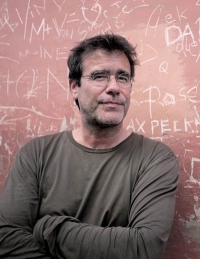 Christophe Héral (born 1960) is a French film and video game composer. He has composed music for video games such as Beyond Good & Evil, The Adventures of Tintin: The Secret of the Unicorn, Rayman Origins, Rayman Legends, and Beyond Good and Evil 2.
Christophe Héral (born 1960) is a French film and video game composer. He has composed music for video games such as Beyond Good & Evil, The Adventures of Tintin: The Secret of the Unicorn, Rayman Origins, Rayman Legends, and Beyond Good and Evil 2.
Tower of Power
 Tower of Power is an American soul and funk based horn section and band, originating from Oakland, California that has been performing for over 40 years.
Tower of Power is an American soul and funk based horn section and band, originating from Oakland, California that has been performing for over 40 years.Tower of Power has been recording and touring continuously since 1968, and the band maintains a very busy tour calendar. In 2008 they celebrated their 40th Anniversary with shows in San Mateo, California in August, and a huge show at the Fillmore in San Francisco on October 18, 2008. At that show many former band members appeared onstage, and the entire event was recorded for a DVD to be released in late-2009.
Tower of Power has released 19 albums over the years (compilations and regional variations not included), the latest being 2009's homage to classic soul songs The Great American Soulbook.
Elvis Costello
 Elvis Costello (born Declan Patrick MacManus, 25 August 1954) is an English singer-songwriter. He came to prominence as an early participant in London's pub rock scene in the mid-1970s and later became associated with the punk/New Wave genre. Steeped in word play, the vocabulary of Costello's lyrics is broader than that of most popular songs. His music has drawn on many diverse genres; one critic described him as a "pop encyclopedia", able to "reinvent the past in his own image".
Elvis Costello (born Declan Patrick MacManus, 25 August 1954) is an English singer-songwriter. He came to prominence as an early participant in London's pub rock scene in the mid-1970s and later became associated with the punk/New Wave genre. Steeped in word play, the vocabulary of Costello's lyrics is broader than that of most popular songs. His music has drawn on many diverse genres; one critic described him as a "pop encyclopedia", able to "reinvent the past in his own image".Costello has won multiple awards in his career, including a Grammy Award, and has twice been nominated for the Brit Award for Best British Male. In 2003, Elvis Costello & the Attractions was inducted into the Rock and Roll Hall of Fame. In 2004, Rolling Stone ranked Costello number 80 on their list of the 100 Greatest Artists of All Time.
Tina Turner
 Tina Turner (born Anna Mae Bullock; November 26, 1939) is an American singer and actress whose career has spanned more than 50 years. She has won numerous awards and her achievements in the rock music genre have earned her the title "The Queen of Rock 'n' Roll". Turner started out her music career with husband Ike Turner as a member of the Ike & Tina Turner Revue. Success followed with a string of hits including "River Deep, Mountain High" and the 1971 hit "Proud Mary". Allegations of spousal abuse following her split with Turner in 1977 arose with the publication of her autobiography I, Tina. Turner rebuilt her career, launching a string of hits beginning in 1983 with "Let's Stay Together" and the 1984 release of her album Private Dancer.
Tina Turner (born Anna Mae Bullock; November 26, 1939) is an American singer and actress whose career has spanned more than 50 years. She has won numerous awards and her achievements in the rock music genre have earned her the title "The Queen of Rock 'n' Roll". Turner started out her music career with husband Ike Turner as a member of the Ike & Tina Turner Revue. Success followed with a string of hits including "River Deep, Mountain High" and the 1971 hit "Proud Mary". Allegations of spousal abuse following her split with Turner in 1977 arose with the publication of her autobiography I, Tina. Turner rebuilt her career, launching a string of hits beginning in 1983 with "Let's Stay Together" and the 1984 release of her album Private Dancer.Her musical career led to film roles, beginning with a prominent role as The Acid Queen in the 1975 film Tommy, and an appearance in Sgt. Pepper's Lonely Hearts Club Band. She starred opposite Mel Gibson as Aunty Entity in Mad Max Beyond Thunderdome for which she received the NAACP Image Award for Outstanding Actress in a Motion Picture, and her version of the film's theme, "We Don't Need Another Hero", was a hit single. She appeared in the 1993 film Last Action Hero.
One of the world's most popular entertainers, Turner has been called the most successful female rock artist and was named "one of the greatest singers of all time" by Rolling Stone. Her records have sold nearly 200 million copies worldwide. She has sold more concert tickets than any other solo music performer in history. She is known for her energetic stage presence, powerful vocals, career longevity, and widespread appeal. In 2008, Turner left semi-retirement to embark on her Tina!: 50th Anniversary Tour. Turner's tour has become one of the highest selling ticketed shows of 2008-2009.
Gregg Allman
 Gregory LeNoir Allman (December 8, 1947 – May 27, 2017) was an American singer-songwriter and musician. He was known for performing in the Allman Brothers Band. Allman grew up with an interest in rhythm and blues music, and the Allman Brothers Band fused it with rock music, jazz, and country at times. He wrote several of the band's biggest songs, including "Whipping Post", "Melissa", and "Midnight Rider". Allman also had a successful solo career, releasing seven studio albums. He was born and spent much of his childhood in Nashville, Tennessee, before relocating to Daytona Beach, Florida.
Gregory LeNoir Allman (December 8, 1947 – May 27, 2017) was an American singer-songwriter and musician. He was known for performing in the Allman Brothers Band. Allman grew up with an interest in rhythm and blues music, and the Allman Brothers Band fused it with rock music, jazz, and country at times. He wrote several of the band's biggest songs, including "Whipping Post", "Melissa", and "Midnight Rider". Allman also had a successful solo career, releasing seven studio albums. He was born and spent much of his childhood in Nashville, Tennessee, before relocating to Daytona Beach, Florida.He and his brother, Duane Allman, formed the Allman Brothers Band in 1969, which reached mainstream success with their 1971 live album At Fillmore East. Shortly thereafter, Duane was killed in a motorcycle crash. The band continued, with Brothers and Sisters (1973) their most successful album. Allman began a solo career with Laid Back the same year, and was perhaps most famous for his marriage to pop star Cher for the rest of the decade. He had an unexpected late career hit with the song "I'm No Angel" in 1987, and his seventh solo album, Low Country Blues (2011), saw the highest chart positions of his career. Throughout his life, Allman struggled with alcohol and substance abuse, which formed the basis of his memoir My Cross to Bear (2012). His final album, Southern Blood, was released posthumously on September 8, 2017.
Allman performed with a Hammond organ and guitar, and was recognized for his soulful voice. For his work in music, Allman was referred to as a Southern rock pioneer and received numerous awards, including one Grammy Award; he was inducted into the Rock and Roll Hall of Fame and the Georgia Music Hall of Fame. His distinctive voice placed him in 70th place in the Rolling Stone list of the "100 Greatest Singers of All Time".
Mozart
 Wolfgang Amadeus Mozart, full name Johann Chrysostom Wolfgang Amadeus Mozart (27 January 1756 â 5 December 1791) was a prolific and influential composer of the Classical era. His over 600 compositions include works widely acknowledged as pinnacles of symphonic, concertante, chamber, piano, operatic, and choral music. Mozart is among the most enduringly popular of classical composers, and many of his works are part of the standard concert repertoire.
Wolfgang Amadeus Mozart, full name Johann Chrysostom Wolfgang Amadeus Mozart (27 January 1756 â 5 December 1791) was a prolific and influential composer of the Classical era. His over 600 compositions include works widely acknowledged as pinnacles of symphonic, concertante, chamber, piano, operatic, and choral music. Mozart is among the most enduringly popular of classical composers, and many of his works are part of the standard concert repertoire.Mozart's music, like Haydn's, stands as an archetypal example of the Classical style. His works spanned the period during which that style transformed from one exemplified by the style galant to one that began to incorporate some of the contrapuntal complexities of the late Baroque, complexities against which the galant style had been a reaction. Mozart's own stylistic development closely paralleled the development of the classical style as a whole. In addition, he was a versatile composer and wrote in almost every major genre, including symphony, opera, the solo concerto, chamber music including string quartet and string quintet, and the piano sonata. While none of these genres were new, the piano concerto was almost single-handedly developed and popularized by Mozart. He also wrote a great deal of religious music, including masses; and he composed many dances, divertimenti, serenades, and other forms of light entertainment.
The central traits of the classical style can be identified in Mozart's music. Clarity, balance, and transparency are hallmarks of his work.
Billy Joel
 William Martin Joel (born May 9, 1949) is an American pianist and singer-songwriter. He released his first hit song, "Piano Man", in 1973. According to the RIAA, he is the sixth best-selling recording artist in the United States.
William Martin Joel (born May 9, 1949) is an American pianist and singer-songwriter. He released his first hit song, "Piano Man", in 1973. According to the RIAA, he is the sixth best-selling recording artist in the United States.Joel had Top 10 hits in the '70s, '80s, and '90s; is a six-time Grammy Award winner, and has sold in excess of 150 million albums worldwide. He was inducted into the Songwriter's Hall of Fame (Class of 1992), the Rock and Roll Hall of Fame (Class of 1999), and the Long Island Music Hall of Fame (Class of 2006). Joel "retired" from recording pop music in 1993 but continued to tour (sometimes with Elton John). In 2001 he subsequently released Fantasies & Delusions, a CD of classical compositions for piano. In 2007 he returned to recording with a single entitled "All My Life," followed by an extensive "World Tour" from 2006-2008, covering many of the major world cities.
Brahms
 Johannes Brahms (May 7, 1833 â April 3, 1897) was a German composer of the Romantic period. He was born in Hamburg and in his later years he settled in Vienna, Austria.
Johannes Brahms (May 7, 1833 â April 3, 1897) was a German composer of the Romantic period. He was born in Hamburg and in his later years he settled in Vienna, Austria.Brahms maintained a Classical sense of form and order in his works â in contrast to the opulence of the music of many of his contemporaries. Thus many admirers (though not necessarily Brahms himself) saw him as the champion of traditional forms and "pure music," as opposed to the New German embrace of program music.
Brahms venerated Beethoven: in the composer's home, a marble bust of Beethoven looked down on the spot where he composed, and some passages in his works are reminiscent of Beethoven's style. The main theme of the finale of Brahms's First Symphony is reminiscent of the main theme of the finale of Beethoven's Ninth, and when this resemblance was pointed out to Brahms he replied that any ass â jeder Esel â could see that.
Ein deutsches Requiem was partially inspired by his mother's death in 1865, but also incorporates material from a Symphony he started in 1854, but abandoned following Schumann's suicide attempt. He once wrote that the Requiem "belonged to Schumann". The first movement of this abandoned Symphony was re-worked as the first movement of the First Piano Concerto.
Brahms also loved the Classical composers Mozart and Haydn. He collected first editions and autographs of their works, and edited performing editions. He also studied the music of pre-classical composers, including Giovanni Gabrieli, Johann Adolph Hasse, Heinrich Schütz and especially Johann Sebastian Bach. His friends included leading musicologists, and with Friedrich Chrysander he edited an edition of the works of François Couperin. He looked to older music for inspiration in the arts of strict counterpoint; the themes of some of his works are modelled on Baroque sources, such as Bach's The Art of Fugue in the fugal finale of Cello Sonata No. 1, or the same composer's Cantata No. 150 in the passacaglia theme of the Fourth Symphony's finale.
John Williams
 John Towner Williams (born February 8, 1932) is an American composer, conductor, and pianist. In a career that spans six decades, Williams has composed many of the most famous film scores in Hollywood history, including Star Wars, Superman, Home Alone, the first three Harry Potter movies and all but two of Steven Spielberg's feature films including the Indiana Jones series, Schindler's List, E.T. the Extra-Terrestrial, Jurassic Park and Jaws. He also composed the soundtrack for the hit 1960s television series Lost in Space as well as the fanfare of the DreamWorks Pictures' logo.
John Towner Williams (born February 8, 1932) is an American composer, conductor, and pianist. In a career that spans six decades, Williams has composed many of the most famous film scores in Hollywood history, including Star Wars, Superman, Home Alone, the first three Harry Potter movies and all but two of Steven Spielberg's feature films including the Indiana Jones series, Schindler's List, E.T. the Extra-Terrestrial, Jurassic Park and Jaws. He also composed the soundtrack for the hit 1960s television series Lost in Space as well as the fanfare of the DreamWorks Pictures' logo.Williams has composed theme music for four Olympic Games, the NBC Nightly News, the rededication of the Statue of Liberty, and numerous television series and concert pieces. He served as the principal conductor of the Boston Pops Orchestra from 1980 to 1993, and is now the orchestra's laureate conductor.
Williams is a five-time winner of the Academy Award. He has also won four Golden Globe Awards, seven BAFTA Awards and 21 Grammy Awards. With 45 Academy Award nominations, Williams is, together with composer Alfred Newman, the second most nominated person after Walt Disney. He was inducted into the Hollywood Bowl Hall of Fame in 2000, and was a recipient of the Kennedy Center Honors in 2004.
Howard Shore
 Howard Leslie Shore (born October 18, 1946) is a Canadian composer, notable for his film scores. He has composed the scores for over 40 films, most notably the scores for The Lord of the Rings film trilogy, for which he won three Academy Awards. He is also a consistent collaborator with director David Cronenberg, having scored all but one of his films since 1979. Shore has also worked with Martin Scorsese, Jonathan Demme, David Fincher and many other filmakers.
Howard Leslie Shore (born October 18, 1946) is a Canadian composer, notable for his film scores. He has composed the scores for over 40 films, most notably the scores for The Lord of the Rings film trilogy, for which he won three Academy Awards. He is also a consistent collaborator with director David Cronenberg, having scored all but one of his films since 1979. Shore has also worked with Martin Scorsese, Jonathan Demme, David Fincher and many other filmakers.He has also composed a few concert works including one opera, The Fly, based on the plot (though not his score) of Cronenberg's 1986 film premiered at the Théâtre du Châtelet in Paris on 2 July 2008., a short piece Fanfare for the Wanamaker Organ and the Philadelphia Orchestra, and a short overture for the Swiss 21st Century Symphony Orchestra.
Shore is a three-time winner of the Academy Award, and has also won two Golden Globe Awards and four Grammy Awards. He is the uncle of film composer Ryan Shore.
Nine Inch Nails
 Nine Inch Nails are an American industrial rock band, founded in 1988 by Trent Reznor in Cleveland, Ohio. Reznor is the main producer, singer, songwriter and instrumentalist, but NIN are still considered a band. NIN's music straddles a wide range of genres, while retaining a characteristic sound using electronic instruments and processing. After recording a new album, Reznor usually assembles a live band to perform with him. The touring band features a revolving lineup that often rearranges songs to fit a live setting. On stage, NIN often employs visual elements to accompany performances, which frequently include light shows.
Nine Inch Nails are an American industrial rock band, founded in 1988 by Trent Reznor in Cleveland, Ohio. Reznor is the main producer, singer, songwriter and instrumentalist, but NIN are still considered a band. NIN's music straddles a wide range of genres, while retaining a characteristic sound using electronic instruments and processing. After recording a new album, Reznor usually assembles a live band to perform with him. The touring band features a revolving lineup that often rearranges songs to fit a live setting. On stage, NIN often employs visual elements to accompany performances, which frequently include light shows.Underground music audiences warmly received Nine Inch Nails in their early years. Reznor produced several highly influential records in the 1990s that achieved widespread popularity; many Nine Inch Nails songs became radio hits, two NIN recordings won Grammy Awards, and the band have sold over 20 million albums worldwide, with 10.5 million sales certified in the US alone. In 1997, Reznor appeared in Time magazine's list of the year's most influential people, and Spin magazine described him as "the most vital artist in music." In 2004, Rolling Stone placed Nine Inch Nails at 94 on its list of the 100 greatest artists of all time. Despite this acclaim, the band have had several feuds with the corporate side of the recording industry. In 2007, these corporate entanglements resulted in Reznor announcing that Nine Inch Nails would split from its label and release future material independently.
Since 1989, Nine Inch Nails have made eight major studio releases. The most recent releases, Ghosts I–IV and The Slip, both released in 2008, were released under Creative Commons licenses. Both were initially released digitally, with physical releases coming later. The digital release of The Slip was made available completely free of charge. NIN have been nominated for twelve Grammy Awards and won twice for the songs "Wish" and "Happiness in Slavery", in 1992 and 1995 respectively.
My Chemical Romance
 My Chemical Romance (often shortened to MCR or My Chem) is an American rock quintet that formed in 2001. The current members of the band are Gerard Way, Mikey Way, Frank Iero, Ray Toro and Bob Bryar. Shortly after forming, the band signed to Eyeball Records and released their debut album I Brought You My Bullets, You Brought Me Your Love in 2002. They signed with Reprise Records the next year and released their major label debut Three Cheers for Sweet Revenge in 2004. The album was a commercial success, selling over one million copies. The band followed this success with 2006's The Black Parade, featuring their hit singles, "Welcome to the Black Parade", "Famous Last Words", "I Don't Love You", and "Teenagers". The band also filmed a live DVD in Mexico City, which was released on July 1, 2008.
My Chemical Romance (often shortened to MCR or My Chem) is an American rock quintet that formed in 2001. The current members of the band are Gerard Way, Mikey Way, Frank Iero, Ray Toro and Bob Bryar. Shortly after forming, the band signed to Eyeball Records and released their debut album I Brought You My Bullets, You Brought Me Your Love in 2002. They signed with Reprise Records the next year and released their major label debut Three Cheers for Sweet Revenge in 2004. The album was a commercial success, selling over one million copies. The band followed this success with 2006's The Black Parade, featuring their hit singles, "Welcome to the Black Parade", "Famous Last Words", "I Don't Love You", and "Teenagers". The band also filmed a live DVD in Mexico City, which was released on July 1, 2008.
Mikis Theodorakis
 Mikis (Michael) Theodorakis (Greek: Μίκης Θεοδωράκης) (born July 29, 1925, Greek island of Chios) is one of the most popular Greek songwriters and composers. Internationally, he is probably best known for his songs and for his scores for the films Zorba the Greek (1964), Z (1969), and Serpico (1973).
Mikis (Michael) Theodorakis (Greek: Μίκης Θεοδωράκης) (born July 29, 1925, Greek island of Chios) is one of the most popular Greek songwriters and composers. Internationally, he is probably best known for his songs and for his scores for the films Zorba the Greek (1964), Z (1969), and Serpico (1973).Politically, he identified with the left until the late 1980s; in 1989, he ran as an independent candidate within the centre-right New Democracy party in order for the country to come out of the political crisis that had been created due to the numerous scandals of the government of Andreas Papandreou and helped to establish a large coalition between conservatives, socialists and leftists. In 1990 he was elected to the parliament (as in 1964 and 1981), became a government minister under Constantine Mitsotakis, and fought against drugs and terrorism and for culture, education and better relations between Greece and Turkey. He continues to speak out in favor of left-liberal causes. He has consistently opposed oppressive regimes and was the key voice against the Greek Junta 1967-1974, which imprisoned him. He has expressed his views on Palestine, the War in Iraq, and Greek-Turkish-Cypriot relations. He has been mentioned as a candidate for the election as President of Greece, but he has refused to be considered.
Miss Saigon
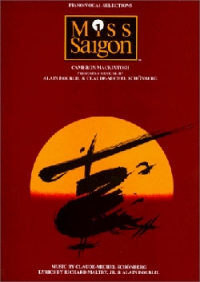 Miss Saigon is a West End musical by Claude-Michel Schönberg and Alain Boublil, with lyrics by Boublil and Richard Maltby, Jr. It premiered at the Theatre Royal, Drury Lane, in London on September 20, 1989, closing after 4,264 performances on October 30, 1999. On April 11, 1991, it opened at the Broadway Theatre in New York City, and closed on January 28, 2001 after 4,092 performances. The musical represented Schönberg and Boublil's second major success, following Les Misérables in 1980. As of August 2007, Miss Saigon is still the 10th longest-running Broadway musical in musical theatre history.
Miss Saigon is a West End musical by Claude-Michel Schönberg and Alain Boublil, with lyrics by Boublil and Richard Maltby, Jr. It premiered at the Theatre Royal, Drury Lane, in London on September 20, 1989, closing after 4,264 performances on October 30, 1999. On April 11, 1991, it opened at the Broadway Theatre in New York City, and closed on January 28, 2001 after 4,092 performances. The musical represented Schönberg and Boublil's second major success, following Les Misérables in 1980. As of August 2007, Miss Saigon is still the 10th longest-running Broadway musical in musical theatre history.Miss Saigon is a modern adaptation of Giacomo Puccini's opera Madame Butterfly, and similarly tells the tragic tale of a doomed romance involving an Asian woman abandoned by her American lover. The setting of the plot is relocated to the 1970s Saigon during the Vietnam War, and Madame Butterfly's American Lieutenant and Japanese geisha coupling is replaced by a romance between an American GI and a Vietnamese bar girl.
The show's inspiration was reportedly a photograph, inadvertently found by Schönberg in a magazine. The photo showed a Vietnamese mother leaving her child at a departure gate at Tan Son Nhut Air Base to board a plane headed for the United States where her father, an ex-GI, would be in a position to provide a much better life for the child. Schönberg considered this mother's actions for her child to be "The Ultimate Sacrifice," an idea central to the plot of Miss Saigon.
Highlights of the show include the evacuation of the last Americans in Saigon from the Embassy roof by helicopter while a crowd of abandoned Vietnamese scream their despair, the victory parade of the new communist regime and the frenzied night club scene on the edge of defeat.
Miss Saigon was part of the major British influence on Broadway in the 1980s, along with the musicals Cats, The Phantom of the Opera, and Les Misérables.
Earth, Wind & Fire
Earth, Wind & Fire (EWF) is an American band that has spanned the musical genres of R&B, soul, funk, jazz, disco, pop, rock, Latin, and Afro pop. They have been described as one of the most innovative and commercially successful bands of all time. Rolling Stone called them "innovative, precise yet sensual, calculated yet galvanizing" and declared that the band "changed the sound of black pop".
The band was founded in Chicago by Maurice White in 1970, having grown out of a previous band known as the Salty Peppers. Other members have included Philip Bailey, Verdine White, Fred White, Ralph Johnson, Larry Dunn, Al McKay and Andrew Woolfolk. The band has received 20 Grammy nominations; they won six as a group and two of its members, Maurice White and Bailey, won separate individual awards. Earth, Wind & Fire has 12 American Music Awards nominations and four awards. They have been inducted into the Rock and Roll Hall of Fame and the Vocal Group Hall of Fame, received a star on the Hollywood Walk of Fame, and have sold over 90 million records, making them one of the world's best-selling bands of all time.
Five members of Earth, Wind & Fire were also inducted into the Songwriters Hall of Fame: Maurice White, Philip Bailey, Verdine White, Larry Dunn, and Al McKay. The band received Lifetime Achievement awards from the American Society of Composers, Authors and Publishers (Rhythm & Soul Heritage Award – 2002), NAACP (Hall of Fame – 1994), and the BET Awards (Lifetime Achievement Award – 2002).
Earth, Wind & Fire is known for its horn section, energetic and elaborate stage shows, and the contrast between Philip Bailey's falsetto vocals and Maurice White's baritone. Of the band's songs two have been inducted into the Grammy Hall of Fame being "That's the Way of the World" in 2004 and "Shining Star" in 2007. As well Earth, Wind & Fire also went on to be bestowed with a Grammy Lifetime Achievement Award.
Earth, Wind & Fire is the first African-American act to sell out Madison Square Garden and to receive the MSG Gold Ticket Award. As well the band went on to be bestowed with the 2012 Congressional Horizon Award.
The band was founded in Chicago by Maurice White in 1970, having grown out of a previous band known as the Salty Peppers. Other members have included Philip Bailey, Verdine White, Fred White, Ralph Johnson, Larry Dunn, Al McKay and Andrew Woolfolk. The band has received 20 Grammy nominations; they won six as a group and two of its members, Maurice White and Bailey, won separate individual awards. Earth, Wind & Fire has 12 American Music Awards nominations and four awards. They have been inducted into the Rock and Roll Hall of Fame and the Vocal Group Hall of Fame, received a star on the Hollywood Walk of Fame, and have sold over 90 million records, making them one of the world's best-selling bands of all time.
Five members of Earth, Wind & Fire were also inducted into the Songwriters Hall of Fame: Maurice White, Philip Bailey, Verdine White, Larry Dunn, and Al McKay. The band received Lifetime Achievement awards from the American Society of Composers, Authors and Publishers (Rhythm & Soul Heritage Award – 2002), NAACP (Hall of Fame – 1994), and the BET Awards (Lifetime Achievement Award – 2002).
Earth, Wind & Fire is known for its horn section, energetic and elaborate stage shows, and the contrast between Philip Bailey's falsetto vocals and Maurice White's baritone. Of the band's songs two have been inducted into the Grammy Hall of Fame being "That's the Way of the World" in 2004 and "Shining Star" in 2007. As well Earth, Wind & Fire also went on to be bestowed with a Grammy Lifetime Achievement Award.
Earth, Wind & Fire is the first African-American act to sell out Madison Square Garden and to receive the MSG Gold Ticket Award. As well the band went on to be bestowed with the 2012 Congressional Horizon Award.
OneRepublic
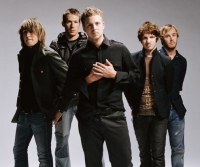 OneRepublic is an American Rock band formed in Colorado. After a few years of moderate success, they have since drawn mainstream attention with the release of their single "Apologize," which has sold in excess of 7 million singles worldwide. The song, according to SoundScan Data, is one of only two songs that have reached 3 million legal downloads in history. A remix of "Apologize" was featured on Timbaland's Shock Value and the band's debut album, Dreaming Out Loud, produced by Greg Wells. Their debut album was released in the United States on November 20, 2007, with international release dates staggered throughout early 2008. As of June 14, 2008, Dreaming Out Loud had sold 761,298 copies in the U.S. with the bands total album sales coming to over 1.5 million worldwide so far. The band's second single, "Stop and Stare," has also crossed the 2 million mark in terms of worldwide single sales. Their third single, "Say (All I Need)", has been released in the UK and in the U.S. Their fourth single will be "Mercy", as stated by OneRepublic's MySpace page. The video has been streamed on Youtube.com.
OneRepublic is an American Rock band formed in Colorado. After a few years of moderate success, they have since drawn mainstream attention with the release of their single "Apologize," which has sold in excess of 7 million singles worldwide. The song, according to SoundScan Data, is one of only two songs that have reached 3 million legal downloads in history. A remix of "Apologize" was featured on Timbaland's Shock Value and the band's debut album, Dreaming Out Loud, produced by Greg Wells. Their debut album was released in the United States on November 20, 2007, with international release dates staggered throughout early 2008. As of June 14, 2008, Dreaming Out Loud had sold 761,298 copies in the U.S. with the bands total album sales coming to over 1.5 million worldwide so far. The band's second single, "Stop and Stare," has also crossed the 2 million mark in terms of worldwide single sales. Their third single, "Say (All I Need)", has been released in the UK and in the U.S. Their fourth single will be "Mercy", as stated by OneRepublic's MySpace page. The video has been streamed on Youtube.com.Current members:
Ryan Tedder – Lead vocals, Guitar, Bass Guitar, Piano, Glockenspiel, Drums (2002–present)
Zach Filkins – Guitar, vocals (2002–present)
Drew Brown – Guitar, Bass Guitar, Glockenspiel (2002–present)
Eddie Fisher – Drums, percussion (2005–present)
Brent Kutzle – Bass guitar, keyboards, cello, vocals (2007–present)
Van Halen
 Van Halen is a hard rock band formed in Pasadena, California in 1972. They enjoyed success from the release of their self titled debut album in 1978. As of 2007 Van Halen has sold more than 80 million albums worldwide and have had the most number one hits on the Billboard Mainstream Rock chart. During the 1980's they also had more Billboard Hot 100 hits than any other hard rock, heavy metal band of the decade. According to the Recording Industry Association of America, Van Halen is the 19th best selling band/artist of all time with sales of over 56 million albums in the USA and is one of five rock bands that have had two albums sell more than 10 million copies in the USA.
Van Halen is a hard rock band formed in Pasadena, California in 1972. They enjoyed success from the release of their self titled debut album in 1978. As of 2007 Van Halen has sold more than 80 million albums worldwide and have had the most number one hits on the Billboard Mainstream Rock chart. During the 1980's they also had more Billboard Hot 100 hits than any other hard rock, heavy metal band of the decade. According to the Recording Industry Association of America, Van Halen is the 19th best selling band/artist of all time with sales of over 56 million albums in the USA and is one of five rock bands that have had two albums sell more than 10 million copies in the USA.In addition to being recognized for success, the band is known for the drama surrounding the exits of former members. The (multiple) exits of singers Sammy Hagar and David Lee Roth were surrounded in controversy and mass press coverage with various contrasting press statements between them and the band. More recently, founding bassist Michael Anthony was kicked out of the band for controversial reasons. Following their 2004 concert tour the band was on a hiatus from the public until September 2006, when new bassist Wolfgang Van Halen's place was confirmed and Roth-reunion rumours began to re-surface coinciding with the band's Rock and Roll Hall of Fame induction on March 12, 2007. After years of speculation, Van Halen began a tour with Roth in late 2007 across North America, which has been extended into 2008. An album is proposed to follow. Along with this, a live tour DVD was announced at their May 13, 2008 concert at the Izod Center that would contain recordings from several performances on their current tour.
Current members:
David Lee Roth – Lead vocals, acoustic guitar
Eddie Van Halen – Guitars, keyboards, bass, backing vocals
Wolfgang Van Halen – Bass, backing vocals
Alex Van Halen – Drums, percussion, backing vocals
Vince Guaraldi
 Vincent Anthony "Vince" Guaraldi (July 17, 1928 – February 6, 1976) was an Italian American jazz musician and pianist noted for his innovative compositions and arrangements and for composing music for animated adaptations of the Peanuts comic strip. Guaraldi was born in San Francisco, California. He graduated from Lincoln High School, attended San Francisco State University, and served as an Army cook in the Korean War.
Vincent Anthony "Vince" Guaraldi (July 17, 1928 – February 6, 1976) was an Italian American jazz musician and pianist noted for his innovative compositions and arrangements and for composing music for animated adaptations of the Peanuts comic strip. Guaraldi was born in San Francisco, California. He graduated from Lincoln High School, attended San Francisco State University, and served as an Army cook in the Korean War.While searching for just the right music to accompany a planned Peanuts television documentary, Lee Mendelson (the producer of the special) heard a single version of "Cast Your Fate to the Wind" by Vince Guaraldi's trio on the radio while traveling in a taxicab on the Golden Gate Bridge in San Francisco, California. Mendelson contacted Ralph J. Gleason, jazz columnist for the San Francisco Chronicle and was put in touch with Guaraldi. He proposed that Guaraldi score the upcoming Peanuts Christmas special and Guaraldi enthusiastically took the job, performing a version of what became "Linus and Lucy" over the phone two weeks later. The soundtrack was recorded by the Vince Guaraldi Trio, whose other members were Puzzy Firth standing in bassist for band member Fred Marshall, who was ill at the time, and drummer Jerry Granelli. Guaraldi went on to compose scores for sixteen Peanuts television specials, plus the feature film A Boy Named Charlie Brown as well as the unaired television program of the same name.
Nirvana
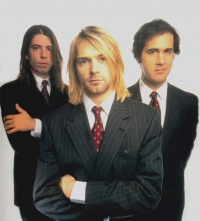 Nirvana was an American rock band that was formed by singer/guitarist Kurt Cobain and bassist Krist Novoselic in Aberdeen, Washington. Nirvana went through a succession of drummers, the longest-lasting being Dave Grohl, who joined the band in 1990.
Nirvana was an American rock band that was formed by singer/guitarist Kurt Cobain and bassist Krist Novoselic in Aberdeen, Washington. Nirvana went through a succession of drummers, the longest-lasting being Dave Grohl, who joined the band in 1990.With the lead single "Smells Like Teen Spirit" from the group's second album Nevermind (1991), Nirvana entered into the mainstream, bringing along with it a subgenre of alternative rock called grunge. Other Seattle grunge bands such as Alice in Chains, Pearl Jam, and Soundgarden also gained popularity, and, as a result, alternative rock became a dominant genre on radio and music television in the United States during the early-to-middle 1990s. As Nirvana's frontman, Kurt Cobain found himself referred to in the media as the "spokesman of a generation", with Nirvana the "flagship band" of "Generation X". Cobain was uncomfortable with the attention and placed his focus on the band's music, challenging the band's audience with its third studio album In Utero (1993).
Nirvana's brief run ended with Cobain's death in April 1994, but the band's popularity continued in the years that followed. In 2002, "You Know You're Right", an unfinished demo from the band's final recording session, topped radio playlists around the world. Since their debut, the band has sold over fifty million albums worldwide. Nirvana are often credited with being one of the most popular and important rock bands of recent years.
Daniel Moretti
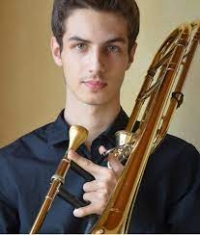 Moretti is a saxophonist and flutist, composer, producer, and audio engineer. He has produced and recorded 17 world releases as a leader.
Moretti is a saxophonist and flutist, composer, producer, and audio engineer. He has produced and recorded 17 world releases as a leader.
The Corrs
 The Corrs are a Celtic folk rock group from Dundalk, County Louth, Ireland. The group consists of the Corr siblings: Andrea (vocals, tin whistle); Sharon (violin, vocals); Caroline (drums, percussion, bodhrán, vocals); and Jim (guitar, keyboards, vocals).
The Corrs are a Celtic folk rock group from Dundalk, County Louth, Ireland. The group consists of the Corr siblings: Andrea (vocals, tin whistle); Sharon (violin, vocals); Caroline (drums, percussion, bodhrán, vocals); and Jim (guitar, keyboards, vocals).The Corrs came to international prominence with their performance at the 1996 Summer Olympics in Atlanta, Georgia. Since then, they have released five studio albums and numerous singles, which have reached platinum in many countries. Talk on Corners, their most successful album to date, reached multi-platinum status in Australia and the UK.
The Corrs have been actively involved in philanthropic activities. They have performed in numerous charity concerts such as the Prince's Trust in 2004 and Live 8 alongside Bono in 2005. The same year, they were awarded honorary MBEs for their contributions to music and charity. The Corrs are on hiatus because Sharon, Jim, and Caroline are raising families, while Andrea is pursuing a solo career.
Joe Cocker
 John Robert "Joe" Cocker, OBE (born 20 May 1944) is an English rock/blues musician, composer and actor who came to popularity in the 1960s, and is most known for his gritty voice, his idiosyncratic arm movements while performing, and his cover versions of popular songs, particularly those of The Beatles. He is the recipient of several awards, including a 1983 Grammy Award for his song "Up Where We Belong", a duet which he performed with Jennifer Warnes. He was ranked #97 on Rolling Stone's 100 greatest singers list.
John Robert "Joe" Cocker, OBE (born 20 May 1944) is an English rock/blues musician, composer and actor who came to popularity in the 1960s, and is most known for his gritty voice, his idiosyncratic arm movements while performing, and his cover versions of popular songs, particularly those of The Beatles. He is the recipient of several awards, including a 1983 Grammy Award for his song "Up Where We Belong", a duet which he performed with Jennifer Warnes. He was ranked #97 on Rolling Stone's 100 greatest singers list.
Debussy
 Achille-Claude Debussy (August 22, 1862 – March 25, 1918) was a French composer. Along with Maurice Ravel, he is considered one of the most prominent figures working within the field of Impressionist music, though he himself intensely disliked the term when applied to his compositions. Debussy was not only among the most important of all French composers but also was a central figure in all European music at the turn of the twentieth century.
Achille-Claude Debussy (August 22, 1862 – March 25, 1918) was a French composer. Along with Maurice Ravel, he is considered one of the most prominent figures working within the field of Impressionist music, though he himself intensely disliked the term when applied to his compositions. Debussy was not only among the most important of all French composers but also was a central figure in all European music at the turn of the twentieth century.Debussy's music virtually defines the transition from late-Romantic music to twentieth century modernist music. In French literary circles, the style of this period was known as Symbolism, a movement that directly inspired Debussy both as a composer and as an active cultural participant.
Elvis Presley
 Elvis Aaron Presley (January 8, 1935–August 16, 1977, middle name sometimes written Aron)a was an American singer, musician and actor. A cultural icon, he is commonly referred to as the "The King of Rock 'n' Roll" or "The King".
Elvis Aaron Presley (January 8, 1935–August 16, 1977, middle name sometimes written Aron)a was an American singer, musician and actor. A cultural icon, he is commonly referred to as the "The King of Rock 'n' Roll" or "The King".In 1954, Presley began his career as the first performer of rockabilly, an uptempo fusion of country and rhythm and blues with a strong back beat. His novel versions of existing songs, mixing "black" and "white" sounds, made him popular—and controversial—as did his uninhibited stage and television performances. He recorded songs in the rock and roll genre, with tracks like "Hound Dog" and "Jailhouse Rock" later embodying the style. Presley had a versatile voice and had unusually wide success encompassing other genres, including gospel, blues, ballads and pop. To date, he has been inducted into four music halls of fame.
In the 1960s, Presley made the majority of his thirty-one movies—mainly poorly reviewed, but financially successful, musicals. In 1968, he returned with acclaim to live music in a television special, and thereafter performed across the U.S., notably in Las Vegas. Throughout his career, he set records for concert attendance, television ratings and recordings sales. He is one of the best-selling and most influential artists in the history of popular music. Health problems, drug dependency and other factors led to his premature death at age 42.
Evita
 Evita is the film adaptation of Andrew Lloyd Webber's musical based on the life of Eva Perón. It was directed by Alan Parker and starred Madonna, Antonio Banderas and Jonathan Pryce. It was released on December 25, 1996 by Hollywood and Cinergi Pictures.
Evita is the film adaptation of Andrew Lloyd Webber's musical based on the life of Eva Perón. It was directed by Alan Parker and starred Madonna, Antonio Banderas and Jonathan Pryce. It was released on December 25, 1996 by Hollywood and Cinergi Pictures.
The Exciters
 The Exciters were an American pop music group of the 1960s. They were originally a girl group, with one male member being added afterwards. At the height of their popularity the group consisted of lead singer Brenda Reid, her husband Herb Rooney, Carolyn Johnson and Lillian Walker.
The Exciters were an American pop music group of the 1960s. They were originally a girl group, with one male member being added afterwards. At the height of their popularity the group consisted of lead singer Brenda Reid, her husband Herb Rooney, Carolyn Johnson and Lillian Walker.
James P. Johnson
 James P. Johnson (born James Price Johnson, also known as Jimmy Johnson; February 1, 1894 – November 17, 1955) was an American pianist and composer. A pioneer of the stride style of jazz piano, he was one of the most important pianists who bridged the ragtime and jazz eras, and, with Jelly Roll Morton, one of the two most important catalysts in the evolution of ragtime piano into jazz. As such, he was a model for Count Basie, Duke Ellington, Art Tatum, and Fats Waller.
James P. Johnson (born James Price Johnson, also known as Jimmy Johnson; February 1, 1894 – November 17, 1955) was an American pianist and composer. A pioneer of the stride style of jazz piano, he was one of the most important pianists who bridged the ragtime and jazz eras, and, with Jelly Roll Morton, one of the two most important catalysts in the evolution of ragtime piano into jazz. As such, he was a model for Count Basie, Duke Ellington, Art Tatum, and Fats Waller.Johnson composed many hit tunes including the theme song of the Roaring Twenties, "Charleston" and "If I Could be With You One Hour Tonight" and remained the acknowledged king of New York jazz pianists through most of the 1930s. Johnson's artistry, his significance in the subsequent development of jazz piano, and his large contribution to American musical theatre, are often overlooked, and as such, he has been referred to by Reed College musicologist David Schiff, as "The Invisible Pianist".
Water Babies

Jim Brickman
 Jim Brickman (born November 20, 1961) is an American composer and pianist. Brickman is known for his solo piano compositions, which are classified as new age music. However, he is as well known for his original love songs and performing them with vocalists such as Martina McBride, Michael W. Smith, Michelle Wright and others.
Jim Brickman (born November 20, 1961) is an American composer and pianist. Brickman is known for his solo piano compositions, which are classified as new age music. However, he is as well known for his original love songs and performing them with vocalists such as Martina McBride, Michael W. Smith, Michelle Wright and others.His music career started when he was nineteen, when Jim Henson hired him to write tunes for Sesame Street. He was also hired to write commercial jingles while in college.
Brickman signed with Windham Hill Records to release his first album, No Words, in 1994. The song "Rocket To The Moon" from that album was the first solo instrumental song ever to be ranked on Billboard's charts. Four of his albums (By Heart, Picture This, The Gift, and Destiny) have all sold over 500,000 copies, qualifying them as gold records in the United States.
Brickman writes a wide variety of music. Besides his piano compositions and love songs, he has also created arrangements of other songs. Several of his albums feature arrangements of children's music; he has produced two Christmas-themed albums The Gift (1997) and Peace (2003); and his 2005 album Grace concentrates on arrangements of well-known Christian music.
Klaus Badelt
 Klaus Badelt (born 1968) is a German composer, best known for composing film scores.
Klaus Badelt (born 1968) is a German composer, best known for composing film scores.Badelt was born in Frankfurt, Germany. He started his musical career composing for many successful movies and commercials in his homeland. In 1998, Oscar-winning film composer Hans Zimmer invited Badelt to work at Media Ventures in Santa Monica, his studio co-owned by Jay Rifkin. Since then, Badelt has been working on a number of his own film and television projects such as The Time Machine and K-19: The Widowmaker. He has also collaborated with other Media Ventures composers, such as Harry Gregson-Williams, John Powell, and Zimmer.
While collaborating with Zimmer, Badelt has contributed to the Oscar-nominated scores for The Thin Red Line and The Prince of Egypt, as well as writing music for many well known directors including Ridley Scott, Tony Scott, Terrence Mallick, John Woo, Kathryn Bigelow, Jeffrey Katzenberg, Tom Cruise, Sean Penn, Gore Verbinski, and Steven Spielberg.
Badelt co-produced the score to Hollywood box office hit Gladiator, directed by Ridley Scott, as well as writing portions of the score with singer/composer Lisa Gerrard. Having contributed music to Gladiator, Mission: Impossible 2 and Michael Kamen's score for X-Men, Badelt was involved in the three most successful movies in 2000. Badelt also collaborated with Zimmer on other successful films, such as The Pledge, and 2001 blockbusters Hannibal and Pearl Harbor. One of his more famous - and more popular - scores is the score to the 2003 film Pirates of the Caribbean: The Curse of the Black Pearl.
Among Badelt's most critically celebrated scores are the Chinese fantasy film The Promise and Dreamworks' remake of The Time Machine, the latter which earned him the Discovery of the Year Award at the World Soundtrack Awards 2003.
Samuel Barber
 Samuel Osborne Barber II (March 9, 1910 – January 23, 1981) was an American composer of orchestral, opera, choral, and piano music. He is one of the most celebrated composers of the 20th century: music critic Donal Henahan stated that "Probably no other American composer has ever enjoyed such early, such persistent and such long-lasting acclaim."
Samuel Osborne Barber II (March 9, 1910 – January 23, 1981) was an American composer of orchestral, opera, choral, and piano music. He is one of the most celebrated composers of the 20th century: music critic Donal Henahan stated that "Probably no other American composer has ever enjoyed such early, such persistent and such long-lasting acclaim."His Adagio for Strings (1936) has earned a permanent place in the concert repertory of orchestras. He was awarded the Pulitzer Prize for Music twice: for his opera Vanessa (1956–57) and for the Concerto for Piano and Orchestra (1962). Also widely performed is his Knoxville: Summer of 1915 (1947), a setting for soprano and orchestra of a prose text by James Agee. At the time of his death, nearly all of his compositions had been recorded.
Catch Me if you Can
 Catch Me If You Can is a musical with a libretto by Terrence McNally and a theatrical score by Marc Shaiman and Scott Wittman. It follows the story of a con artist named Frank Abagnale, Jr. A majority of the plot is borrowed from the 2002 film of the same name, which in turn was based on Abagnale's 1980 autobiography.
Catch Me If You Can is a musical with a libretto by Terrence McNally and a theatrical score by Marc Shaiman and Scott Wittman. It follows the story of a con artist named Frank Abagnale, Jr. A majority of the plot is borrowed from the 2002 film of the same name, which in turn was based on Abagnale's 1980 autobiography.After a tryout musical performance in Seattle in 2009, Catch Me If You Can opened at Broadway's Neil Simon Theatre in April 2011. The production received four Tony Awards nominations, including one for Best Musical, winning Best Actor in a Musical for Norbert Leo Butz.
Panic at the Disco
 Panic at the Disco (formerly known as Panic! at the Disco) is a rock band that originated in Las Vegas, Nevada, USA. Their sound incorporates elements of pop punk, big beat, electronica, techno, and rock, along with many other genres like psychedelic, baroque pop, folk and jazz. Their 2005 debut album, A Fever You Can't Sweat Out, reached #13 on the US Billboard 200, and has sold over 2.2 million copies since its September 2005 release. The band's second album, Pretty. Odd., was released on March 25, 2008 and debuted at #2 in the US.
Panic at the Disco (formerly known as Panic! at the Disco) is a rock band that originated in Las Vegas, Nevada, USA. Their sound incorporates elements of pop punk, big beat, electronica, techno, and rock, along with many other genres like psychedelic, baroque pop, folk and jazz. Their 2005 debut album, A Fever You Can't Sweat Out, reached #13 on the US Billboard 200, and has sold over 2.2 million copies since its September 2005 release. The band's second album, Pretty. Odd., was released on March 25, 2008 and debuted at #2 in the US.
Isaac Albeniz
 Isaac Albéniz i Pascual (Spanish pronunciation: ) (May 29, 1860 – May 18, 1909) was a Spanish pianist and composer best known for his piano works based on folk music.
Isaac Albéniz i Pascual (Spanish pronunciation: ) (May 29, 1860 – May 18, 1909) was a Spanish pianist and composer best known for his piano works based on folk music.Albéniz’ Suite Española Op.47 is comprised mainly of pieces written in 1886, and grouped together in 1887 in honor of the Queen of Spain. Like many of Albéniz' piano pieces, these works are miniature tone pictures of different geographical regions and musical idioms of Spain. The eight original titles are Granada, Cataluna, Sevilla, Cadiz, Asturias, Aragon, Castilla and Cuba but only the first three titles and Cuba appeared in the original collection. The other pieces were published in later collections, often with different titles. The publisher Hofmeister published all eight titles of Suite Espanola in 1911 after Albéniz’ death, appropriating other pieces for the other four titles so those pieces do not always accurately reflect the geographic designation of the titles, most obviously in the case of Asturias (Leyenda) whose Andalusian flamenco rhythms bear little resemblance to the music of the northern province Asturias. The opus number 47 assigned by Hofmeister has no relation to any chronological order in Albéniz’ oeuvre, in which opus numbers were randomly given by publishers or by Albéniz himself, with some pieces appearing in more than one collection.
Tchaikovsky
 Pyotr Il'yich Tchaikovsky (May 7 1840 â November 6 1893) was a Russian composer of the Romantic era. While not part of the nationalistic music group known as "The Five", Tchaikovsky wrote music which, in the opinion of Harold Schonberg, was distinctly Russian: plangent, introspective, with modally-inflected melody and harmony.
Pyotr Il'yich Tchaikovsky (May 7 1840 â November 6 1893) was a Russian composer of the Romantic era. While not part of the nationalistic music group known as "The Five", Tchaikovsky wrote music which, in the opinion of Harold Schonberg, was distinctly Russian: plangent, introspective, with modally-inflected melody and harmony.Aesthetically, Tchaikovsky remained open to all aspects of Saint Petersburg musical life. He was impressed by Serov and Balakirev as well as the classical values upheld by the conservatory. Both the progressive and conservative camps in Russian music at the time attempted to win him over. Tchaikovsky charted his compositional course between these two factions, retaining his individuality as a composer as well as his Russian identity. In this he was influenced by the ideals of his teacher Nikolai Rubinstein and Nikolai's brother Anton.
Tchaikovsky's musical cosmopolitanism led him to be favored by many Russian music-lovers over the "Russian" harmonies and styles of Mussorgsky, Borodin and Rimsky-Korsakov.
Nonetheless he frequently adapted Russian traditional melodies and dance forms in his music, which enhanced his success in his home country. The success in St. Petersburg at the premiere of his Third Orchestral Suite may have been due in large part to his concluding the work with a polonaise. He also used a polonaise for the final movement of his Third Symphony.
Maroon 5
 Maroon 5 is a Grammy Award-winning American pop rock band. Formed with only two members at the French Woods Festival of the Performing Arts and expanded in Los Angeles, the group comprises five members: Adam Levine (lead vocals, rhythm guitar), James Valentine (lead guitar, backing vocals), Jesse Carmichael (keyboards, rhythm guitar, backing vocals), Mickey Madden (bass guitar), and Matt Flynn (drums, percussion).
Maroon 5 is a Grammy Award-winning American pop rock band. Formed with only two members at the French Woods Festival of the Performing Arts and expanded in Los Angeles, the group comprises five members: Adam Levine (lead vocals, rhythm guitar), James Valentine (lead guitar, backing vocals), Jesse Carmichael (keyboards, rhythm guitar, backing vocals), Mickey Madden (bass guitar), and Matt Flynn (drums, percussion).
Rent
 Rent is a rock musical, with music and lyrics by Jonathan Larson based on Giacomo Puccini's opera La Bohème. It tells the story of a group of impoverished young artists and musicians struggling to survive and create in New York's Lower East Side in the thriving days of the Bohemian East Village, under the shadow of AIDS.
Rent is a rock musical, with music and lyrics by Jonathan Larson based on Giacomo Puccini's opera La Bohème. It tells the story of a group of impoverished young artists and musicians struggling to survive and create in New York's Lower East Side in the thriving days of the Bohemian East Village, under the shadow of AIDS.Rent won a Tony Award for Best Musical and a Pulitzer Prize, among other awards. In addition, its cast was unusually ethnically diverse. Rent brought controversial topics to a traditionally conservative medium, and it helped to increase the popularity of musical theater amongst the younger generation. "Rent speaks to Generation X the way that the musical Hair spoke to the baby boomers or those who grew up in the 1960s, calling it "a rock opera for our time, a Hair for the 90s."
The musical was first seen at the New York Theatre Workshop in 1994. On January 26, 1996, Rent opened in New York City off-Broadway before moving to Broadway's Nederlander Theatre on April 29, 1996. Rent has been successful on Broadway, where it had critical acclaim and word-of-mouth popularity. The Broadway production of Rent closed on September 7, 2008 after a 12 year run and 5,124 performances, making it the seventh-longest-running Broadway show. The production has grossed over $280 million. At the time of its closing, it was the second-longest-running musical currently on Broadway, eight years behind The Phantom of the Opera.
Liz Callaway
 Liz Callaway (born April 13, 1961) is an American actress and singer who provided the singing voices of many female characters in animated films, such as Anya/Anastasia in Anastasia, Odette in The Swan Princess, Jasmine in the Aladdin sequels The Return of Jafar and Aladdin and the King of Thieves, and adult Kiara in The Lion King II: Simba's Pride.
Liz Callaway (born April 13, 1961) is an American actress and singer who provided the singing voices of many female characters in animated films, such as Anya/Anastasia in Anastasia, Odette in The Swan Princess, Jasmine in the Aladdin sequels The Return of Jafar and Aladdin and the King of Thieves, and adult Kiara in The Lion King II: Simba's Pride.
Chopin
 Frédéric Chopin (1 March 1810 – 17 October 1849) was a Polish composer and virtuoso pianist of the Romantic period. He is widely regarded as the greatest Polish composer, and ranks as one of music's greatest tone poets.
Frédéric Chopin (1 March 1810 – 17 October 1849) was a Polish composer and virtuoso pianist of the Romantic period. He is widely regarded as the greatest Polish composer, and ranks as one of music's greatest tone poets.He was born in the village of Żelazowa Wola, in the Duchy of Warsaw, to a Polish mother and French-expatriate father, and in his early life was regarded as a child-prodigy pianist. In November 1830, at the age of 20, Chopin went abroad; following the suppression of the Polish November Uprising of 1830–31, he became one of many expatriates of the Polish "Great Emigration."
In Paris, he made a comfortable living as a composer and piano teacher, while giving few public performances. A Polish patriot,
Chopin's extant compositions were written primarily for the piano as a solo instrument. Though technically demanding, Chopin's style emphasizes nuance and expressive depth rather than virtuosity. Chopin invented musical forms such as the ballade and was responsible for major innovations in forms such as the piano sonata, waltz, nocturne, étude, impromptu and prelude. His works are mainstays of Romanticism in 19th-century classical music.
Suessical
 Seussical is a musical by Lynn Ahrens and Stephen Flaherty based on the stories of Dr. Seuss (mainly "Horton Hears a Who!", "Horton Hatches the Egg" and "Miss Gertrude McFuzz") that debuted on Broadway in 2000. The play's story is a complex amalgamation of many of Seuss's most famous books. After a Broadway run, the production spawned two US national tours and a UK tour. It has become a beloved classic for schools, communities, and regional theatres.
Seussical is a musical by Lynn Ahrens and Stephen Flaherty based on the stories of Dr. Seuss (mainly "Horton Hears a Who!", "Horton Hatches the Egg" and "Miss Gertrude McFuzz") that debuted on Broadway in 2000. The play's story is a complex amalgamation of many of Seuss's most famous books. After a Broadway run, the production spawned two US national tours and a UK tour. It has become a beloved classic for schools, communities, and regional theatres.
Bach
 Johann Sebastian Bach (31 March 1685 – 28 July 1750) was a German composer and organist whose sacred and secular works for choir, orchestra, and solo instruments drew together the strands of the Baroque period and brought it to its ultimate maturity. Although he introduced no new forms, he enriched the prevailing German style with a robust contrapuntal technique, an unrivalled control of harmonic and motivic organisation in composition for diverse musical forces, and the adaptation of rhythms and textures from abroad, particularly Italy and France.
Johann Sebastian Bach (31 March 1685 – 28 July 1750) was a German composer and organist whose sacred and secular works for choir, orchestra, and solo instruments drew together the strands of the Baroque period and brought it to its ultimate maturity. Although he introduced no new forms, he enriched the prevailing German style with a robust contrapuntal technique, an unrivalled control of harmonic and motivic organisation in composition for diverse musical forces, and the adaptation of rhythms and textures from abroad, particularly Italy and France.Revered for their intellectual depth and technical and artistic beauty, Bach's works include the Brandenburg concertos; the Goldberg Variations; the English Suites, French Suites, Partitas, and Well-Tempered Clavier; the Mass in B Minor; the St. Matthew Passion; the St. John Passion; The Musical Offering; The Art of Fugue; the Sonatas and Partitas for violin solo; the Cello Suites; more than 200 surviving cantatas; and a similar number of organ works, including the celebrated Toccata and Fugue in D Minor.
While Bach's fame as an organist was great during his lifetime, he was not particularly well-known as a composer. His adherence to Baroque forms and contrapuntal style was considered "old-fashioned" by his contemporaries, especially late in his career when the musical fashion tended towards Rococo and later Classical styles. A revival of interest and performances of his music began early in the 19th century, and he is now widely considered to be one of the greatest composers in the Western tradition.
Various
Puccini
 Giacomo Antonio Domenico Michele Secondo Maria Puccini (December 22, 1858 – November 29, 1924) was an Italian composer whose operas, including La Bohème, Tosca, and Madama Butterfly, are among the most frequently performed in the standard repertoire. Some of his arias, such as "O Mio Babbino Caro" from Gianni Schicchi, "Che gelida manina" from La Bohème, and "Nessun Dorma" from Turandot, have become part of popular culture.
Giacomo Antonio Domenico Michele Secondo Maria Puccini (December 22, 1858 – November 29, 1924) was an Italian composer whose operas, including La Bohème, Tosca, and Madama Butterfly, are among the most frequently performed in the standard repertoire. Some of his arias, such as "O Mio Babbino Caro" from Gianni Schicchi, "Che gelida manina" from La Bohème, and "Nessun Dorma" from Turandot, have become part of popular culture.The subject of Puccini's style is one that has been long avoided by musicologists; this avoidance can perhaps be attributed to the perception that his work, with its emphasis on melody and evident popular appeal, lacked "seriousness" (a similar prejudice beset Rachmaninoff during his lifetime). Despite the place Puccini clearly occupies in the popular tradition of Verdi, his style of orchestration also shows the strong influence of Wagner, matching specific orchestral configurations and timbres to different dramatic moments. His operas contain an unparalleled manipulation of orchestral colors, with the orchestra often creating the scene’s atmosphere.
The structures of Puccini's works are also noteworthy. While it is to an extent possible to divide his operas into arias or numbers (like Verdi's), his scores generally present a very strong sense of continuous flow and connectivity, perhaps another sign of Wagner’s influence. Like Wagner, Puccini used leitmotifs to connote characters (or combinations of characters). This is apparent in Tosca, where the three chords which signal the beginning of the opera are used throughout to announce Scarpia. Several motifs are also linked to Mimi and the Bohemians in La Bohème and to Cio-Cio-San's eventual suicide in Butterfly. Unlike Wagner, though, Puccini's motifs are static: where Wagner's motifs develop into more complicated figures as the characters develop, Puccini's remain more or less identical throughout the opera (in this respect anticipating the themes of modern musical theatre).
Jon Schmidt
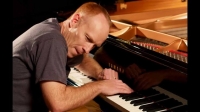 Jon Schmidt (born 1966) is an American pianist, composer, piano teacher, and author. Classically trained, he branched into New Age music in his 20s and has developed a classical crossover style that blends classical, contemporary, and rock and roll. He has released eight solo albums and seven piano books containing original scores. Since 2010 he has been a member of The Piano Guys musical group, performing on their YouTube videos, albums, and in concert.
Jon Schmidt (born 1966) is an American pianist, composer, piano teacher, and author. Classically trained, he branched into New Age music in his 20s and has developed a classical crossover style that blends classical, contemporary, and rock and roll. He has released eight solo albums and seven piano books containing original scores. Since 2010 he has been a member of The Piano Guys musical group, performing on their YouTube videos, albums, and in concert.
Rascal Flatts
 Rascal Flatts is an American Grammy Award-winning country music group founded in Nashville, Tennessee. Since its inception, Rascal Flatts has been composed of three members: Gary LeVox (lead vocals), Jay DeMarcus (bass guitar, vocals), and Joe Don Rooney (lead guitar, vocals). DeMarcus and LeVox are also second cousins.
Rascal Flatts is an American Grammy Award-winning country music group founded in Nashville, Tennessee. Since its inception, Rascal Flatts has been composed of three members: Gary LeVox (lead vocals), Jay DeMarcus (bass guitar, vocals), and Joe Don Rooney (lead guitar, vocals). DeMarcus and LeVox are also second cousins.Rascal Flatts has released five studio albums and a live compilation to date, all on Lyric Street Records. Their first two albums, 2000's Rascal Flatts and 2002's Melt, have been certified 2× Multi-Platinum and 3× Multi-Platinum, respectively, in the United States, while 2004's Feels Like Today and 2006's Me and My Gang have received 5× Multi-Platinum and 4× Multi-Platinum certifications respectively. 2007's Still Feels Good, their most recent album, is certified 2× Multi-Platinum.
To date, they have also released twenty-two singles on the U.S. Billboard Hot Country Songs charts; of these, eight have reached Number One. A cover of Tom Cochrane's "Life Is a Highway", from the soundtrack to the 2006 film Cars, also entered the country music charts from unsolicited airplay.
Daft Punk
 Daft Punk is an electronic music duo consisting of French musicians Guy-Manuel de Homem-Christo (born February 8, 1974) and Thomas Bangalter (born January 3, 1975). Daft Punk reached significant popularity in the late 1990s house movement in France and met with continued success in the years following, combining elements of house with synthpop. The duo is also credited with producing songs that are considered essential in the French house scene. They were managed from 1996 to 2008 by Pedro Winter (Busy P), the head of Ed Banger Records. Early in the group's career, the band members were strongly influenced by groups such as The Beach Boys and The Rolling Stones. Bangalter and de Homem-Christo were originally in a band called Darlin', which disbanded after a short period of time, leaving the two to experiment musically on their own.
Daft Punk is an electronic music duo consisting of French musicians Guy-Manuel de Homem-Christo (born February 8, 1974) and Thomas Bangalter (born January 3, 1975). Daft Punk reached significant popularity in the late 1990s house movement in France and met with continued success in the years following, combining elements of house with synthpop. The duo is also credited with producing songs that are considered essential in the French house scene. They were managed from 1996 to 2008 by Pedro Winter (Busy P), the head of Ed Banger Records. Early in the group's career, the band members were strongly influenced by groups such as The Beach Boys and The Rolling Stones. Bangalter and de Homem-Christo were originally in a band called Darlin', which disbanded after a short period of time, leaving the two to experiment musically on their own.The duo became Daft Punk, and released their critically acclaimed debut album Homework in 1997. The 2001 release Discovery was even more successful, driven by the club singles "One More Time", "Digital Love" and "Harder, Better, Faster, Stronger". In March 2005, the duo released the album Human After All to mixed reviews. However, the singles "Robot Rock" and "Technologic" achieved success in the United Kingdom. Daft Punk toured throughout 2006 and 2007 and released the live album Alive 2007, which won a Grammy award for Best Electronic/Dance Album. The duo composed the score of the film Tron: Legacy and in 2010 released the soundtrack album of the film. Daft Punk are noted for their elaborate live shows, in which visual elements and effects are incorporated with the music. The group is also known for its emphasis on visual and story components associated with their musical productions, as well as for wearing disguises, most notably, ornate robot costumes in public and while performing.
Final Fantasy VII
 Final Fantasy VII is a role-playing video game developed by Square for the PlayStation console. Released in 1997, it is the seventh main installment in the Final Fantasy series. Published in Japan by Square, it was released in the West by Sony Computer Entertainment, becoming the first in the series to be released in Europe. The game's story follows Cloud Strife, a mercenary who joins an eco-terrorist organization to stop the world-controlling megacorporation, Shinra, from using the planet's life essence as an energy source. Events send Cloud and his allies in pursuit of Sephiroth, a superhuman intent on destroying their planet. During the journey, Cloud builds close friendships with his party members, including Aerith Gainsborough, who holds the secret to saving their world.
Final Fantasy VII is a role-playing video game developed by Square for the PlayStation console. Released in 1997, it is the seventh main installment in the Final Fantasy series. Published in Japan by Square, it was released in the West by Sony Computer Entertainment, becoming the first in the series to be released in Europe. The game's story follows Cloud Strife, a mercenary who joins an eco-terrorist organization to stop the world-controlling megacorporation, Shinra, from using the planet's life essence as an energy source. Events send Cloud and his allies in pursuit of Sephiroth, a superhuman intent on destroying their planet. During the journey, Cloud builds close friendships with his party members, including Aerith Gainsborough, who holds the secret to saving their world.Development on Final Fantasy VII began in 1994 for the Super NES. After delays and technical difficulties from experimenting on several platforms, Square ultimately moved development to the PlayStation, largely due to the advantages of the CD-ROM format. Veteran series staff returned, including series creator and producer Hironobu Sakaguchi, director Yoshinori Kitase, and composer Nobuo Uematsu. The title became the first in the series to use full motion video and 3D computer graphics, with most scenes using character models superimposed over pre-rendered backgrounds. Although the gameplay systems remained mostly unchanged from previous entries, Final Fantasy VII featured science fiction elements with a more realistic presentation. The scale of development was unprecedented at the time, with a combined development and marketing budget of over USD$80 million, and a staff of over 100.
Final Fantasy V
 Final Fantasy V (ファイナルファンタジーV Fainaru Fantajī Faibu) is a medieval-fantasy role-playing video game developed and published by Square (now Square Enix) in 1992 as a part of the Final Fantasy series. The game first appeared only in Japan on Nintendo's Super Famicom (known internationally as the Super Nintendo Entertainment System). It has been ported with minor differences to Sony's PlayStation and Nintendo's Game Boy Advance. An original video animation produced in 1994 called Final Fantasy: Legend of the Crystals serves as a sequel to the events depicted in the game. It was released for the PlayStation Network on April 6, 2011 in Japan. An enhanced port of the game, with new high resolution graphics and a touch-based interface, was released for iPhone and iPad on March 28, 2013, and for Android on September 25, 2013.
Final Fantasy V (ファイナルファンタジーV Fainaru Fantajī Faibu) is a medieval-fantasy role-playing video game developed and published by Square (now Square Enix) in 1992 as a part of the Final Fantasy series. The game first appeared only in Japan on Nintendo's Super Famicom (known internationally as the Super Nintendo Entertainment System). It has been ported with minor differences to Sony's PlayStation and Nintendo's Game Boy Advance. An original video animation produced in 1994 called Final Fantasy: Legend of the Crystals serves as a sequel to the events depicted in the game. It was released for the PlayStation Network on April 6, 2011 in Japan. An enhanced port of the game, with new high resolution graphics and a touch-based interface, was released for iPhone and iPad on March 28, 2013, and for Android on September 25, 2013.The game begins as a wanderer named Bartz investigates a fallen meteor. There, he encounters several characters, one of whom reveals the danger facing the four Crystals that control the world's elements. These Crystals act as a seal on Exdeath, an evil sorcerer. Bartz and his party must keep the Crystals from being exploited by Exdeath's influence and prevent his resurgence.
Final Fantasy V has been praised for the freedom of customization that the player has over the characters, achieved through the greatly expanded Job System. Despite being released only in Japan, the Super Famicom version sold more than two million copies. The PlayStation version has earned "Greatest Hits" status, selling more than 350,000 copies.
Search for Free Sheet Music
You can make a search through the entire collection of sheets.
You can make a search through the entire collection of sheets.
Hi, fellow musicians!
There is no registration required to download the sheets but you can subscribe to our mailing list to get notified of new sheets.
There is no registration required to download the sheets but you can subscribe to our mailing list to get notified of new sheets.
Latest Artists
Charles Aznavour
× 1
Dvorak × 1
Atie Bernet × 1
Jimmy Rowles × 1
Masato Nakamura × 1
Coldplay × 3
Roy Hargrove × 1
Bette Midler × 1
Hatsune Miku × 1
Ah Doe × 3
Roupa Nova × 1
Raymond Pauls × 1
Gershwin & Heifetz × 1
Vivaldi × 4
Loveholic × 1
Tony Hatch × 1
Jekyll and Hyde × 1
Fleetwood Mac × 1
Anthony Philip Heinrich × 1
Agustín Lara × 1
Wim Zwaag × 1
Johnny Mercer × 1
Abraham Chasins × 1
Pyotr Ilyich Tchaikovsky × 1
Arthur Hartmann × 1
Michael Jackson × 2
Blink 182 × 1
Francis Poulenc × 1
The Secret Garden × 1
Elgar × 1
Sonny Rollins × 1
Earlene Rentz × 1
Rodion Shchedrin × 1
Laura Story × 1
Nobuo Uemastu × 1
Jon Mortimer × 1
Borodin × 1
Memories Off × 1
Super Mario Bros × 1
Liszt × 4
Sean Kingston × 1
Santana × 1
Ellie Lily Farrer × 1
Luigi Boccherini × 2
Astor Piazzola × 2
Joseph-Hector Fiocco × 1
Beethoven × 2
Monkey Island × 1
Westlife × 1
Marc Shaiman × 1
Dvorak × 1
Atie Bernet × 1
Jimmy Rowles × 1
Masato Nakamura × 1
Coldplay × 3
Roy Hargrove × 1
Bette Midler × 1
Hatsune Miku × 1
Ah Doe × 3
Roupa Nova × 1
Raymond Pauls × 1
Gershwin & Heifetz × 1
Vivaldi × 4
Loveholic × 1
Tony Hatch × 1
Jekyll and Hyde × 1
Fleetwood Mac × 1
Anthony Philip Heinrich × 1
Agustín Lara × 1
Wim Zwaag × 1
Johnny Mercer × 1
Abraham Chasins × 1
Pyotr Ilyich Tchaikovsky × 1
Arthur Hartmann × 1
Michael Jackson × 2
Blink 182 × 1
Francis Poulenc × 1
The Secret Garden × 1
Elgar × 1
Sonny Rollins × 1
Earlene Rentz × 1
Rodion Shchedrin × 1
Laura Story × 1
Nobuo Uemastu × 1
Jon Mortimer × 1
Borodin × 1
Memories Off × 1
Super Mario Bros × 1
Liszt × 4
Sean Kingston × 1
Santana × 1
Ellie Lily Farrer × 1
Luigi Boccherini × 2
Astor Piazzola × 2
Joseph-Hector Fiocco × 1
Beethoven × 2
Monkey Island × 1
Westlife × 1
Marc Shaiman × 1










